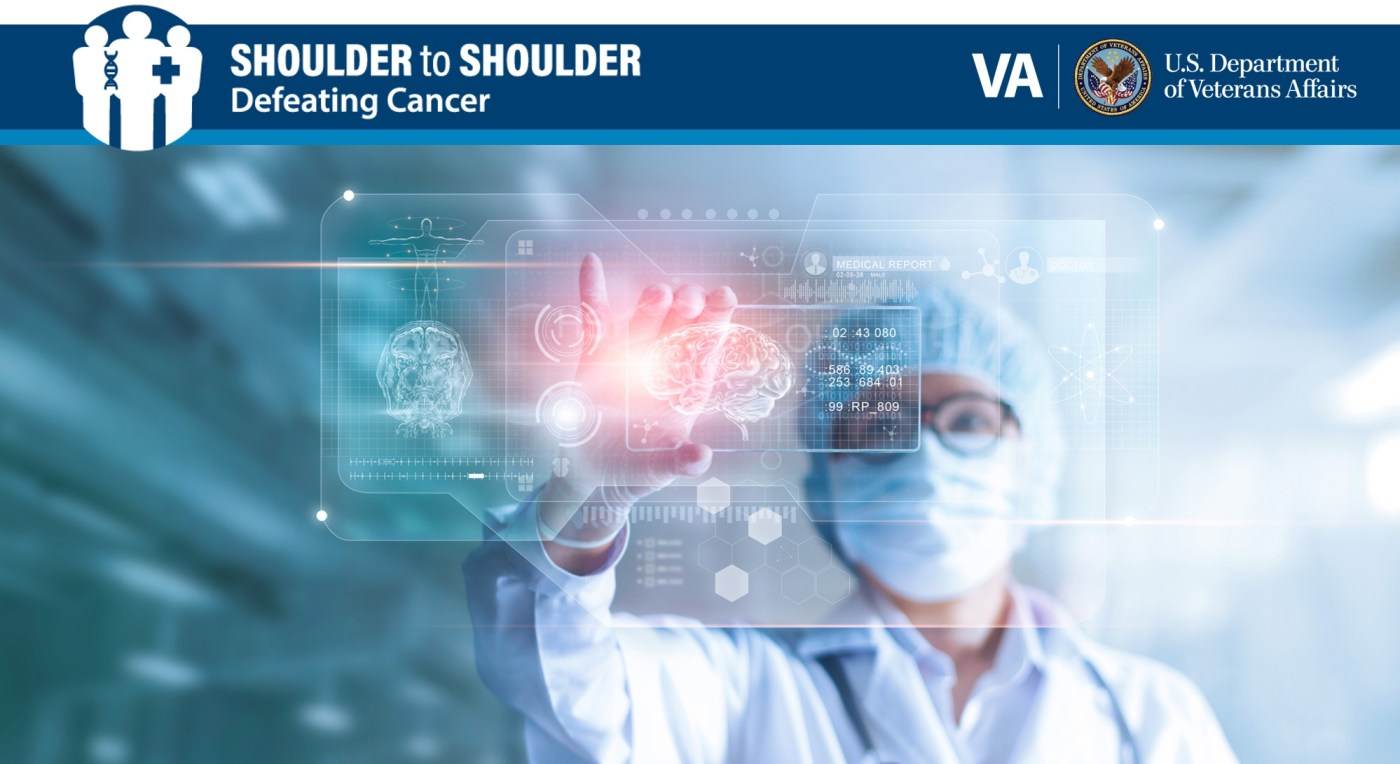VA and Veterans are standing shoulder to shoulder in the fight to defeat cancer. With 50,000 Veterans diagnosed with cancer every year, the Veterans Health Administration’s (VHA) National Oncology Program (NOP) is providing Veterans with the same level of evidence-based cancer care found within the leading, private-sector health care and academic institutions.
NOP’s National Precision Oncology Program (NPOP) is guided by evidence-based best practices and substantiated by the latest innovative cancer research. NPOP increases collaboration between VA researchers and clinicians to better identify the proper cancer treatment through DNA-based precision oncology. VA’s integrated, coordinated learning network ensures all Veterans have equal access to the most advanced and effective cancer treatments, which reduces the disparities seen in cancer care in the private sector.
What is precision oncology?
Precision oncology uses genetic testing or sequencing, called precision screening, to improve rates of detection, diagnosis and treatment outcomes for Veterans living with cancer. With genetic sequencing, VA oncologists and clinicians can more accurately identify the right drugs (e.g., chemotherapy, immunotherapy) based on a Veteran’s tumor mutation. Once identified, oncologists can then administer the most effective treatment with the fewest side effects. Through a series of multisite trials (e.g., the Research for the Precision Oncology Program, the Precision Oncology Data Repository, and the Million Veteran Program), VA is expanding access to precision oncology and collecting more data for further innovative research.
Army Veteran David Atkinson was impacted by VA’s precision oncology efforts firsthand after discovering he had a type of aggressive prostate cancer. For nearly three decades since his departure from the Army, Atkinson found no need to use VA health care services. When he was diagnosed with cancer, it was VA’s innovative cancer care that changed his life. Through precision oncology, his doctor, Dr. Julie Graff, was able to identify and recommend the best treatment for his specific cancer. When Atkinson’s health insurance would not cover the medication, VA stepped in and provided it, leading to incredible results.
“When she [Dr. Graff] and I saw the numbers, some tears rolled in because we’ve been fighting this obviously for two years,” Atkinson said. “To see the drug working as effectively as it is, like she believed it would, and I hoped it would, we were just overwhelmed with joy.”
It takes team effort
Development and application of such life-saving innovations cannot be done alone; it takes a team. To contribute to the rapid advancement of cancer treatment, VA partners with academic and private sector research programs to make VA the leading resource in the world for cancer care. VA’s partnership with the Prostate Cancer Foundation has built a network of 12 funded Centers of Excellence. VA’s Precision Oncology Program for Cancer of the Prostate (POPCaP) network brings next-generation sequencing (sequencing the human genome at high speed and low cost) to Veterans. Along with these joint ventures, VA, the Department of Defense and the National Cancer Institute have combined efforts to provide even greater access to VA data and robust computing resources that help the broader research community advance cancer treatment.
With more than 300 ongoing oncology research projects, the future of Veteran cancer care has never looked more promising. Through research, analysis and compassionate care delivery, VA is changing medicine. VA is finding cancer cases earlier, improving diagnostic accuracy, providing more targeted therapies and giving Veterans greater reassurance on their treatment decisions, all the while reinforcing their confidence in having chosen VA.
Michael Rubin, LCSW-C is a program specialist with VHA’s Office of Healthcare Transformation.
Topics in this story
More Stories
Give your full body the gift of your attention with this week's #LiveWholeHealth practice: Full Body Progressive Muscle Relaxation.
Lulu Bang learned there was a large population of unhoused Veterans in Central Ohio and she wanted to help keep them warm.
For Veterans battling cancer, time is precious. At Dallas VA, one nurse is leading the charge to reduce the hours spent traveling and waiting.






the v.a. is a failed platform caused mothing but pain and suffering for me for 18 years. destroyed my credit and now will die hecause of no treatment and theft of monies from me. for youbto say you treat vetscwith cancer is svhodvdamm lie! my most recent OIG case indicating torture.
the v.a. has tortured me for 18 years. now they have killed me by not treating me. m.o. for v.a.
Timothy chapman I was diagnosed with lung cancer and ten months later I have not got even a aspirin to treat it I feel like v.a. is out to kill me .this is nice but who do you have to be to get real help.
Hi Mr. Miller,
Please email me at my VA email julie.graff@va.gov so that I help you.
Best,
Julie Graff
julie.graff@va.gov
I am currently undergoing treatment for a carcinoid tumor in my airway with a process known as photo dynamic therapy, due to agent orange exposure. Up until now, I had never heard of this procedure. I am being treated by Dr. Amit Goyal at Hines VA in Illinois and am pleased to hear that VA is such a pioneer in cancer treatment. Congratulations to the VA. God Bless All.